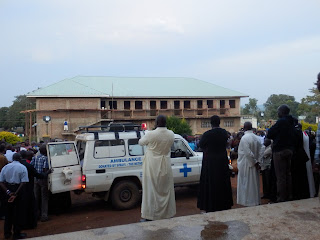On Friday 19 August 2016, the parish priest of Zeu Parish in the Diocese of Nebbi was found dead. He was only 55 years old and a dedicated and caring priest.
The outpouring of grief but also of love, respect and great affection was palpable when his body arrived at the Cathedral on Sunday evening. Hundreds of people had waited for over two hours to receive his body into the mother church of the Diocese.
Father William's Requiem Mass was today (Monday 22 August 2016 - Feast of the Queenship of Mary (marking the octave of the Solemnity of the Assumption of the Blessed Virgin Mary into heaven). It lasted just under four hours. The Requiem focused on the role of Father William as a priest and also the suddenness of his death and the need for us all to be prepared for the Lord's call. Throughout he was accompanied by his family, his brother priests and perhaps between 2,500 and 3,000 people from the Diocese of Nebbi, neighbouring Dioceses, other faiths and civic leaders.
May Father William rest and peace and may his Mother and six brothers and sisters be comforted in their grief.
In paradisum deducant te Angeli; in tuo adventu suscipiant te martyres, et perducant te in civitatem sanctam Ierusalem. Chorus angelorum te suscipiat, et cum Lazaro quondam paupere æternam habeas requiem.
May the angels lead you into paradise; may the martyrs receive you at your arrival and lead you to the holy city Jerusalem. May choirs of angels receive you and with Lazarus, once (a) poor (man), may you have eternal rest.
When I learned of Father William's death, I was reading the late Bishop of Derry's, Edward Daly, autobiography
Mister, are you a priest? (Bishop Daly is probably best remembered as the priest, waving a blood stained handkerchief, who on Bloody Sunday helped carry a dying young man through the streets of the Bogside in Derry to an ambulance) . At the end of the book, Bishop Daly had included the following prayer written by the Jesuit Karl Rahmer. It made me think about how much we ask of our priests, our clergy, how quick we are to criticise and so often how slow we are to love and value them...
THE PRIEST
The priest is not an angel sent from heaven
He is a man chosen from among men,
A member of the Church, a Christian.
Remaining man and Christian, he begins to speak of you the Word of God.
The word is not his own.
No, he comes to you because God has told him to proclaim God’s Word.
Perhaps he has not entirely understood it himself.
Perhaps he adulterates it.
But he believes, and despite his fear he knows he must communicate God’s Word to you.
For must not some of us say something about God,
About eternal life; about the majesty of grace in our sanctified being?
Must not some one of us speak of sin, the judgement and mercy of God?
So, my dear friends, pray for him, carry him,
So that he might be able to sustain others by bringing to them
The mystery of God’s love revealed in Jesus Christ.


















































